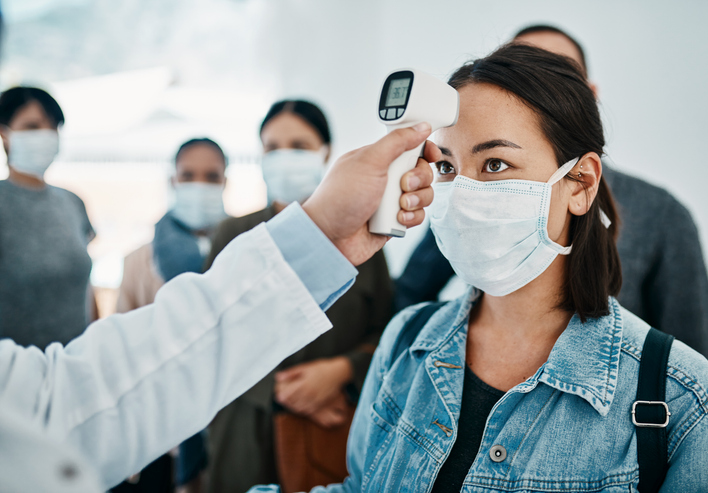Lisa-Maria Kellermayr was an outspoken advocate of vaccinations and other measures to control the spread of coronavirus. This made her a target for Corona conspiracy theorists and anti-vaxxers.
For months, she reported attacks on social media, as well as threatening letters from people writing they wanted to “slaughter” her and her staff. People purporting to be patients came to her office during hours in order to disrupt practice operations.
The 36-year-old physician was found dead in her medical practice in a lakeside resort of Seewalchen am Attersee in Upper Austria on Friday. Prosecutors said three suicide notes were found at the scene and said they were not treating the death as suspicious.*
On Wednesday, an autopsy was conducted at the request of Kellermayr’s family. “No evidence of third-party interference has come to light,” a spokesman for the public prosecutor’s office in the city of Wels in Upper Austria said afterward.

In Vienna on Monday, thousands held a vigil for Lisa-Maria Kellermayr
The trail leads to Germany
Kellermayr had reported multiple incidences of abuse and threats to the police. She said she felt she was not taken seriously and received no protection, although, she alleged, some threats came from violent right-wing extremists already known to the authorities.
Kellermayr then hired an armed security guard at her own expense. When the State Security Service in Austria began to take action at the end of June, the doctor had already closed her practice. Because of threats to her life made by COVID deniers and anti-vaxxers, she told her followers on Twitter.
Police investigators in Austria initially said that the alleged abusers could not be traced because the threats were sent using the dark net. However, journalists were able to identify two suspects in Germany within a matter of hours on Monday.
Not an isolated incident
The president of the Medical Association of Saxony (Sächsische Landesärztekammer) Erik Bodendieck told DW that there has been a sharp increase in the number of attacks on medical staff — both online and face-to-face — since the start of the pandemic.
“We see it in the doctor’s office, in the clinic, in the emergency room, ambulance service, various places. It’s not just online or by letter. The bad thing at the end is that attackers are so cowardly and don’t even give their name,” Bodendieck said.
Bodenieck has himself been the target of personal attacks for publishing medical opinions. He sees the attacks against medical personnel and emergency workers as symptoms of a change in society.
“I think we are seeing a brutalization of our society, there is an increasing lack of understanding of fellow human beings and society in the minds of our people,” he said.

In Germany, there has been an increase in incidents where emergency workers were prevented from doing their jobs, or were even physically attacked
Peter Bobbert, the president of the Berlin Doctors’ Association (Ärztekammer Berlin), has also seen an increase in the number of threats to medical personnel in the German capital.
“We are aware of some cases where concrete threats have taken place in practices, hospitals, and health centers that even led to some practices having to close temporarily because the staff working there were justifiably unable to carry out normal activities given the situation,” he told DW.
Bobbert said that medical staff had noticed a change in the working atmosphere in practices and in hospitals.
“The most important thing we actually have in our profession, the doctor-patient relationship, which is characterized by trust, is also changing. Trust is replaced by mistrust. In my view, all of this leads to a very, very unpleasant atmosphere in the medical field, which ultimately leads to a deterioration of our medical work. It is a disturbing development,” Bobbert said.

Civil rights activist Katharina Nocun urges tougher action on hate speech
Fighting hate speech
Publicist and civil rights activist Katharina Nocun says that far too little is being done to address online abuse in Germany, which she says is often directed most viciously against women.
“We know that online threats and abuse are handled differently by police forces from state to state. That means that a victim who does go to the police cannot be sure that their case will be handled appropriately, they don’t know if they will be supported or accused of overreacting, and that’s the biggest problem I think here in Germany,” she told DW.
“There needs to be better training for the police and above all, there have to be consequences when nothing is done — it simply cannot be tolerated that victims of threats and violence are not taken seriously when they go to the police,” she said.
“When somebody has been threatened, it doesn’t matter what medium is used to make the threat,” Nocun said, objecting to the terms “online hate” or “online threats.” The actual medium that is used is not the issue, she argued.
In response to Lisa-Maria Kellermayr’s death, medical professionals have expressed their fears and concern about the damage being done to public debate when scientists, journalists, and medical professionals are silenced.
The president of the Medical Association of Saxony Erik Bodendieck says that politicians have failed to respond to calls from doctors for stricter laws to ensure the safety of medical professionals, forcing many to leave the profession.
“It’s not the lack of money that drives people out, it’s these types of conditions. I have been trying to explain this to state politicians since August 2020, what we think has gone wrong in the handling of the pandemic. Politics has indeed not responded to our calls accordingly.”
Edited by: Rina Goldenberg
Editor’s note: If you are suffering from a serious emotional strain or suicidal thoughts, do not hesitate to seek professional help. You can find information on where to find such help, no matter where you live in the world, at this website: https://www.befrienders.org/
While you’re here: Every Tuesday, DW editors round up what is happening in German politics and society. You can sign up here for the weekly email newsletter Berlin Briefing.




















Discussion about this post